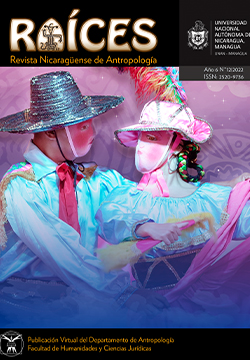Vivir en transición en el Estado de México:
Nahuas, purépechas y totonacas resistiendo en la sobremodernidad
DOI:
https://doi.org/10.5377/raices.v6i12.15572Palabras clave:
Sobremodernidad, identidad, étnico, resistencia, migraciónResumen
En el pueblo de San Francisco Tepojaco, Cuautitlán Izcalli, Estado de México, existen migrantes que pertenecen a las etnias nahua, purépecha y totonaca. Su construcción identitaria se da de forma dinámica y multivalente poniendo en evidencia que revisar sus sistemas de pertenencia es uno de los grandes retos de la sobremodernidad. El presente artículo cientifico es el resultado de un análisis etnográfico realizado acerca de asentamientos indígenas dentro del pueblo ya mencionado. Los procesos y las prácticas que llevan a cabo en los nuevos espacios de residencia, lejos de su lugar de origen, constituyen escenarios multifacéticos y peculiares en la conformación de su sentir étnico, lo que representa una resistencia cultural. Los resultados de la investigación explican que las identidades étnicas en la sobremodernidad tienen la característica de ser efímeras, cambiantes e indefinidas, ya que se rigen por el contexto antroposociohistórico en el que acaecen. Así, sus sistemas de pertenencia se redefinen constantemente según el tiempo y el lugar dónde se encuentren. Derivado de esto los migrantes étnicos que buscan establecerse en espacios de transición rural-urbanos están conscientes de que jugaran de forma ambivalente con los elementos que los definen según sean las circunstancias en las que se encuentran. Con el trabajo de campo se comenzaron a cuestionar los paradigmas que se tenían y se abordó una mirada desde una perspectiva sociocultural y más neutral centrándose en las particularidades y relativismos desde la visión del nativo, pero sin perder la cuestión interpretativa de la que precisa la ciencia antropológica. La entrevista cualitativa también se usó como técnica para confirmar la información proporcionada por los sujetos de estudio.
Descargas
257
Citas
Augé, Marc. “Anonimato y sobremodernidad”. Espai en Blanc, 2009. Acceso: 29/03/2022.
Bauman, Zygmunt. Modernidad liquida. Fondo de Cultura Económica: 2007.
Bazán, Claudia. “Saliendo de los márgenes: las transformaciones de la subjetividad en el marco de una acción política alternativa”. Universidad de Buenos Aires, 2012. Acceso: 29/03/2022.
De la Peña, Guillermo. “El enfoque situacional y el estudio de redes y asociaciones urbanas en contextos pluriétnicos”. Revista Nueva Antropología, 2015. Acceso: 29/03/2022.
Gómez, Pedro. “La identidad étnica, la manía nacionalista y el multiculturalismo como rebrotes racistas y amenazas contra la humanidad”. Gazeta de Antropología, 2012. Acceso: 29/03/2022.
Lipovetsky, Gilles. La era del vacío. Anagrama, 1983.
López, Juan. “Una aproximación a la crisis de identidades y una propuesta de investigación empírica”. Universidad de Granada, 2012. Acceso: 29/03/2022.
Descargas
Publicado
Cómo citar
Número
Sección
Licencia
Derechos de autor 2023 © Universidad Nacional Autónoma de Nicaragua, Managua, UNAN-Managua

Esta obra está bajo una licencia internacional Creative Commons Atribución-NoComercial-CompartirIgual 4.0.
Esta licencia permite a los reutilizadores distribuir, remezclar, adaptar y desarrollar el material en cualquier medio o formato únicamente con fines no comerciales, y siempre y cuando se otorgue la atribución al creador. Si remezcla, adapta o construye sobre el material, debe licenciar el material modificado bajo términos idénticos.




